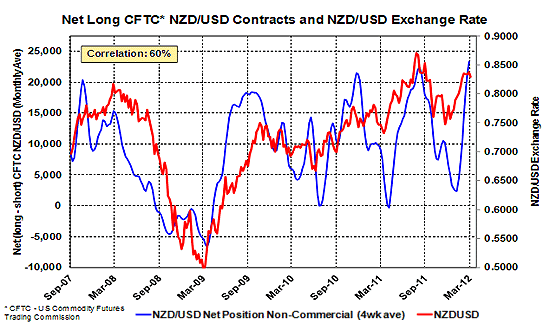
 By Roger J Kerr
By Roger J Kerr
Several economic lead-indicators for the Kiwi dollar were positive last week and suggested the NZD/USD rate should have been pushed higher well above 0.8400.
The Chinese Performance of Manufacturing Index (“PMI”) increased to 51.0 instead of pulling back as was the prior expectation, local NZ business confidence was up strongly and the NZ sharemarket was pushed up to six-month highs by bullish equity investors.
It is instructive that the NZD currency could not attract fresh new buyers despite these positive variables.
The NZD/USD rate has yet again retreated from rates above 0.8400 and trades below 0.8300 at the time writing this column. Market positioning by speculators, hedge funds and proprietary trading desks of global investment banks was heavily long Kiwi up until late last week, however this has reduced on profit-taking and stop orders as the Kiwi dollar failed to make new highs.
Long NZD positions (NZ dollars speculatively purchased in expectation of further NZD strength against the USD) on the Chicago futures exchange were also at extreme highs, explaining the gains from 0.7500 to 0.8400 in January/February.
However, as the chart below indicates, the Kiwi dollar is always prone to selling on profit-taking from these “over-bought” futures market situations.
Also contributing to the pullback in the NZD/USD rate was lower global commodity prices (CRB Index correcting down due to lower crude oil prices), a stronger USD against the EUR (the Euro weakening from above $1.3400 to $1.3180 due to Spain defying EU requirements) and the second Chinese “services” PMI measure being much weaker due to the Chinese New Year holidays.
---------------------------------------------------------------
To subscribe to our free daily Currency Rate Sheet and News email, enter your email address here.
------------------------------------------------------------------------------------------------------------------------------------------
While the positive economic fundamentals (compared to others) for New Zealand of high export prices, +3% GDP growth and generally lower Government debt to GDP ratios suggest continued NZD strength in the medium term, the short term prognosis is that the Kiwi dollar should correct back to the 0.7800-0.8000 region before potential further gains later in the year.
A key influencing variable from June onwards will be the timing of interest rate increases by the RBNZ. A pointer to their view on the outlook for the NZ economy this year will come in their quarterly Monetary Policy Statement on Thursday 8th March.
Private sector economist growth forecasts for 2012 vary wildly from the +1.5% from the perma-pessimists, NZIER to above +3.00% from BNZ and our good selves at APRM.
The RBNZ would be unwise to fall into the trap that others seem to be making that the European economic and debt problems present major headwinds for the global and NZ economy. Continuing improvements in Chinese, US and NZ economic data over recent months prove this viewpoint to be wide of the mark.
The reality is that the NZ economy is arguably expanding at a annual 3% rate at the moment and provided the NZD pulls back from the mid-0.8000’s it can continue that growth rate in 2012.
Therefore, provided the NZD does not stay well above 0.8000 over the next six months, the RBNZ will be required to start lifting the OCR from 2.5% by September.
Rising NZ interest rates in late 2012 and into 2013 will be occurring at a time when all other interest rates around the world are stable.
History tells us that the NZ dollar does follow interest rate movements closely, even if this linkage has broken down over the last three years.
Further USD gains against the Euro, Pound and Yen over coming weeks/months should be matched by both the NZD and AUD weakening against the USD. That results in the various cross-rates (EUR/NZD, GBP/NZD and JPY/NZD) remaining at their newly elevated levels.

--------------------
* Roger J Kerr runs Asia Pacific Risk Management. He specialises in fixed interest securities and is a commentator on economics and markets. More commentary and useful information on fixed interest investing can be found at rogeradvice.com
No chart with that title exists.

We welcome your comments below. If you are not already registered, please register to comment
Remember we welcome robust, respectful and insightful debate. We don't welcome abusive or defamatory comments and will de-register those repeatedly making such comments. Our current comment policy is here.